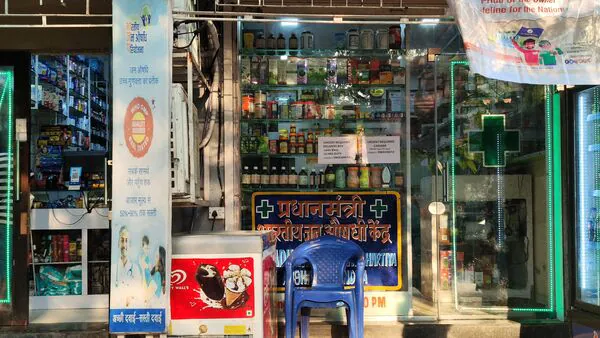Centre Drops Minimum Distance Rule For Opening Jan Aushadhi Kendras In Urban Areas
The Pharmaceuticals & Medical Devices Bureau of India's (PMBI) decision, effective 10 September, is intended to improve public access to affordable generic medicines by helping meet the target to open 25,000 stores by 31 March 2027, according to the documents reviewed by Mint and government officials close to the development.
As of now, 17,000 Jan Aushadhi Kendras are operational, offering 2,047 medicines and 300 surgical items.
Also Read | CVC Capital to exit Healthcare Global via ₹550 crore block deal“By relaxing the distance rules, especially in densely populated urban areas, the PMBI is trying to accelerate the establishment of new Kendras and ensure they are more equitably distributed,” said a government official on the condition of anonymity.
“The department was getting a lot of queries from people with an interest in opening these Kendras in their cities. However, due to the minimum-distance-requirement clause, they were not able to do so,” the official added.
The rule change will enable the opening of two or more stores in close proximity in the seven metropolitan cities of Delhi, Mumbai, Kolkata, Chennai, Bengaluru, Hyderabad, and Ahmedabad.
The government has also struck down the one-kilometre rule for opening new stores in 46 other cities with populations above one million, except when a new Kendra is proposed near one that has been operational for less than two years. In such cases, the distance norm will continue until the two-year period is complete.
Also Read | Somerset Indus nears $275-million close for third healthcare fundIn all other cities and towns, the one-kilometre minimum distance rule will continue to apply.
“By making it easier to open multiple stores in high-demand areas, the government hopes to increase the availability of generic medicines, which are sold at prices 50-90% lower than their branded counterparts. This will directly lead to substantial savings for citizens,” the official said.
“Furthermore, this expansion will also generate employment by engaging individual entrepreneurs in opening and running these Kendras,” the official added.
The Pradhan Mantri Bhartiya Janaushadhi Pariyojana (PMBJP) is the government's flagship scheme to provide quality medicines at affordable rates. Implemented by the PMBI under the department of pharmaceuticals, its aim is to cut patients' out-of-pocket medical expenses and promote generic medicines by dispelling the notion that low-cost drugs are inferior.
Under the scheme, the government provides a monthly incentive of up to ₹20,000 and a one-time infrastructure incentive of ₹2 lakh for establishing Jan Aushadhi Kendras in specific areas or for certain demographic groups.
Also Read | GST 2.0 made healthcare cheaper. So, why are investors sulking?To ensure quality, all Jan Aushadhi medicines are procured from drug makers that comply with the World Health Organization's good manufacturing practices (WHO-GMP).
Queries sent to the spokesperson of the department of pharmaceuticals remained unanswered.
Legal Disclaimer:
MENAFN provides the
information “as is” without warranty of any kind. We do not accept
any responsibility or liability for the accuracy, content, images,
videos, licenses, completeness, legality, or reliability of the information
contained in this article. If you have any complaints or copyright
issues related to this article, kindly contact the provider above.
Most popular stories
Market Research

- Japan Buy Now Pay Later Market Size To Surpass USD 145.5 Billion By 2033 CAGR Of 22.23%
- BTCC Summer Festival 2025 Unites Japan's Web3 Community
- GCL Subsidiary, 2Game Digital, Partners With Kucoin Pay To Accept Secure Crypto Payments In Real Time
- Smart Indoor Gardens Market Growth: Size, Trends, And Forecast 20252033
- Nutritional Bar Market Size To Expand At A CAGR Of 3.5% During 2025-2033
- Pluscapital Advisor Empowers Traders To Master Global Markets Around The Clock






















Comments
No comment